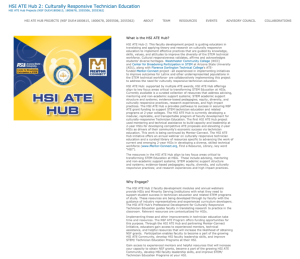Collaborative Research: HSI ATE Hub 2: Professional Development for Culturally Responsive Technician Education

This project aims to better serve and support a diverse population of students who are pursuing credentials in skilled technical fields. To do so, the project will guide faculty to adapt and implement Culturally Responsive Instruction in technician education courses. The project is designed to increase the retention of Hispanic students in STEM career pathways, particularly in advanced-technology fields. The project builds on the Hispanic Serving Community College KickStarter project, the Hispanic Serving Institutions HSI/ATE Hub project, and the Westchester Community College Photonics and Laser Project. The project team will develop, pilot test, and disseminate a faculty professional development model that can help to shift faculty understanding, practice, and mindset from emphasis on perceived student deficits to asset-based thinking and mutual respect. The professional development will be organized into three tiers. Tier 1 is designed to establish awareness and support first steps. Tier 2 will focus on the development, implementation, and testing of Culturally Responsive Instruction practices in technician education. Tier 3 will focus on creating a community of instructors and emerging leaders that engages in practice, theory building, and applied research into effective educational practices. The overall project goal is to develop faculty knowledge, skills, values, attitudes, and mindset so that more Hispanic students will complete advanced technology programs. In doing so, the project can increase the diversity of the technician workforce and help to mitigate disproportionate impacts of COVID-19 on Hispanic communities.
This collaboration includes faculty and administrators in technician education programs, higher education researchers, experts in Culturally Responsive Instruction, and industry partners to further conceptualize, operationalize, and test the validity of Culturally Responsive Instruction in the skilled technical fields of applied engineering and applied computing and cyber-security. Additionally, the project will test the hypothesis that micro-credentials are valuable for incentivizing faculty participation in project activities and that micro-credentials will be recognized by educational and industry stakeholders as valuable evidence of expertise and experience. The mixed method evaluation is process -oriented to facilitate development of a model and outcomes-oriented to assess faculty and student outcomes that includes assessment of changes in knowledge/awareness, skills/behavior, and attitudes/mindset.
Comments